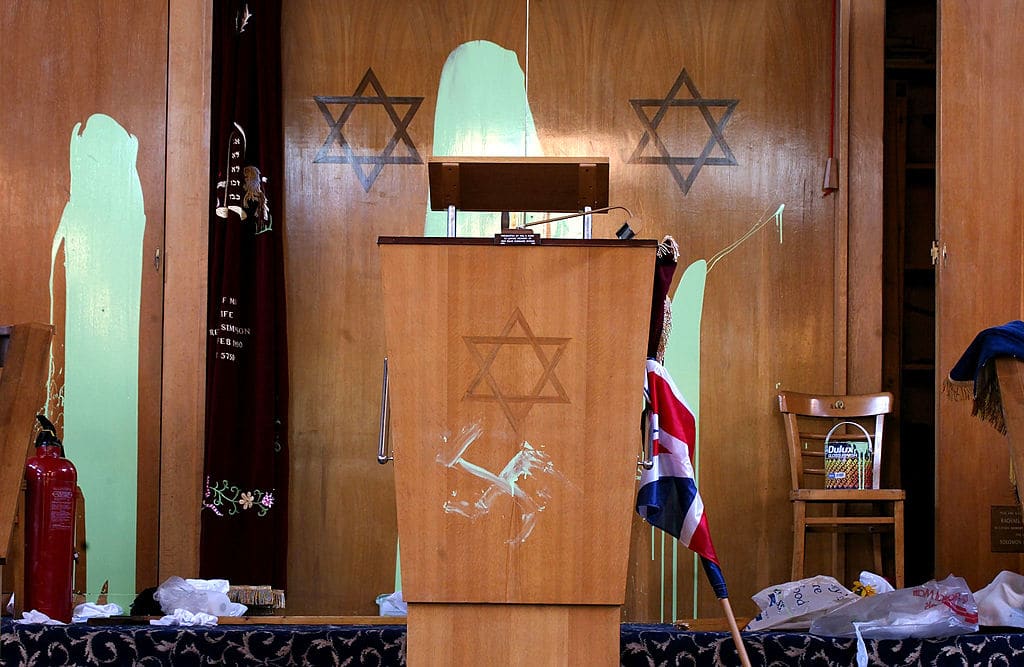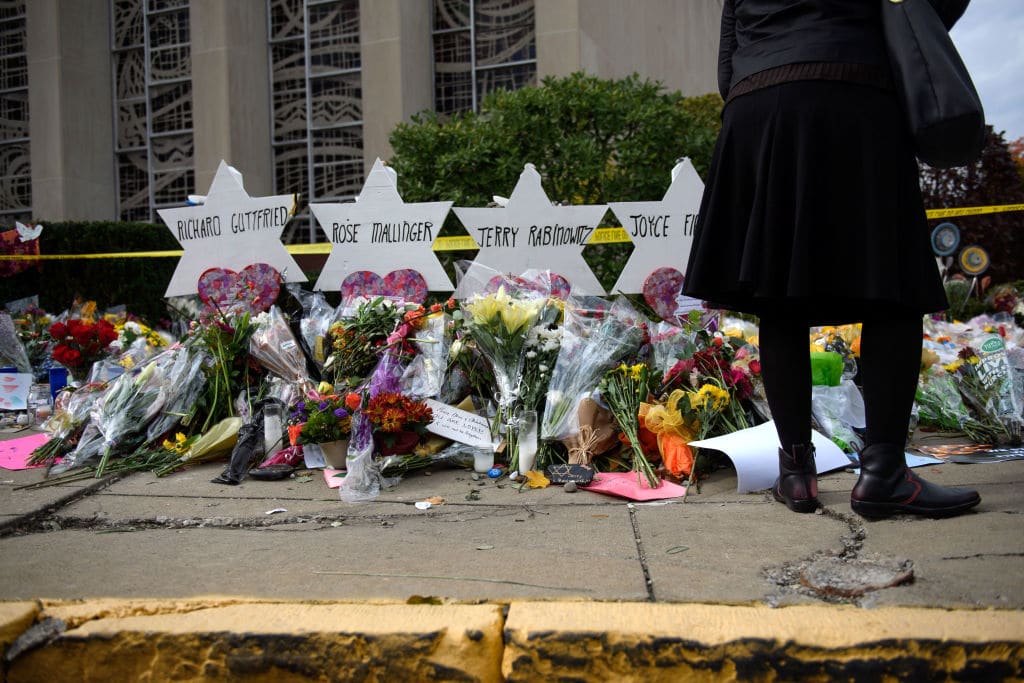If you asked most Westerners today whether they oppose antisemitism, most would likely say “yes.”
And yet, whenever something terrible happens in the world, it seems like it’s only a matter of time before someone blames the Jews for it.
No seriously, those are all real.
The problem is not just words. It’s conspiracy theories that have deadly consequences, as massacres of Jews from Pittsburgh to Paris demonstrate. Far from fading away, anti-Jewish prejudice seems as resilient as ever.

So if we agree that antisemitism is bad, why is it still such a big problem?
By answering some of the biggest questions about antisemitism — the sort that confuse many people and keep them from seeing and confronting the hate…
We’ll learn together how to effectively tackle anti-Semitism: what it actually is, how to recognize it … and what to do about it.
Didn’t antisemitism go away after the Holocaust?
Apparently not.
Yet a surprising number of people think that anti-Jewish bigotry was stamped out after the horrors of Nazi Germany. After all, didn’t we make a bunch of Holocaust movies and get past this stuff?
But while it’s comforting to imagine that antisemitism largely disappeared after World War II, it’s far from accurate. And if we make the mistake of reducing antisemitism to the Holocaust—its most extreme manifestation—we’re likely to miss much of the problem today.
That’s because the Holocaust wasn’t an antisemitic exception — it was antisemitism’s culmination.
“I went through the Holocaust and I hate what is going on here because I feel this is how it started in Hungary.” Listen to this 89-year-old survivor explain why she attended today’s #NoFearRally. pic.twitter.com/B0ecrUNDRw
— Unpacked (@JewishUnpacked) July 11, 2021
The systematic murder of six million Jews across Europe didn’t happen in a vacuum. It came after years of religious, scientific, cultural, and political antisemitism. For centuries, European Jews were barred from most professions, forcibly converted to other faiths, and subjected to murderous rampages, constant expulsions, and periodic inquisitions.
In other words, the mass murder of European Jewry would not have been possible without many centuries of anti-Jewish ideas and assumptions.
Take the Holocaust away, and you still have this massive antisemitic foundation underneath.
In fact, we are still living with it.
It’s not just a feeling, Jew hatred is on the rise. pic.twitter.com/lpURTEWAX7
— Johnny Kunza (@johnkunza) May 20, 2021
Put another way: Just as slavery’s abolition in America didn’t end racism, the defeat of Nazi Germany didn’t end antisemitism.
The statistics bear this out. According to the F.B.I., American Jews are annually subject to the most hate crimes of any religious group, despite making up only 2% of the U.S. population. Not only that, but since the F.B.I. began tracking these crimes, more of them have been committed against Jews than all these groups combined.
Hate crimes statistics are an imperfect metric. But they give you a sense of the ugly anti-Jewish undercurrent that has always lurked beneath the surface.

Recently, more people have started to notice this unsettling reality, as American Jews have been subjected to a series of antisemitic terrorist attacks and massacres. These include the mass shooting at Pittsburgh’s Tree of Life synagogue in October 2018; the April 2019 attack on a synagogue in Poway, California; the shooting at a kosher supermarket in Jersey City, New Jersey in December 2019; and the mass stabbing of religious Jews at their Hanukkah celebration that same month by a machete-wielding assailant in Monsey, New York.
Yet, as bad as this is, the picture is considerably darker in Europe.
In 2018, CNN surveyed European attitudes towards Jewish people. They found that more than a quarter of Europeans believed that Jews have too much influence in finance.
Nearly one in four said that Jews had too much influence in wars and conflicts around the world.
Antisemitism in Europe:
— EUJS – European Union of Jewish Students (@EUJS) October 2, 2020
There was an attack on a kosher restaurant in Paris today. “Hitler was right” was sprayed onto the walls of the destroyed restaurant.
The protection and security of Jewish communities must be a top priority for European govts! pic.twitter.com/ubO78SxHgz
One in five Europeans said that Jews had too much influence in the media and almost the same number claimed they have too much influence in politics.
These conspiracy theories about vast Jewish power are particularly ludicrous when you realize that Jews constitute less than 0.2% of the entire European population. (And most Europeans have never even met one.)
The consequences of this widespread hostility towards Jews, however, are severe. In 2013 and 2018, researchers at the European Union’s Agency for Fundamental Rights asked Jews about their experiences of antisemitism. What they found was alarming.
Nearly 40% of European Jews were afraid of publicly identifying as Jewish.
Nearly half were worried about being the victim of anti-Semitic harassment in the next 12 months.
And one-third feared being the victim of a physical assault.
And for good reason.
In recent years, Jews have been the victims of brutal antisemitic attacks at schools and synagogues across Europe, from Sweden to France to Poland.
Police have identified the car and are currently searching for the occupants.
— Michael Cowan (@mrmikecowan) May 16, 2021
They drove through North London shouting “F*ck the Jews, rape their daughters”.
For the avoidance of doubt, Jews are not responsible for Israeli government policy #antisemitism pic.twitter.com/Ae8mVWXfla
Put together, it’s easy to understand why so many of Europe’s Jews still live in fear, 75 years after the Holocaust, why nearly 40% of them say they’ve considered leaving because they don’t feel safe—and why millions of them already have.
The same is true in many non-Western countries. Jews in Arab and Muslim lands once numbered nearly a million, but now number only a few thousand, having been persecuted to the point of expulsion or flight in the last century. And anti-Jewish prejudice has persisted throughout the region–even in the absence of Jews.
Why does this matter to us? Because if we only see and confront antisemitism when it looks like the Holocaust or is committed by obvious actors like neo-Nazis, we’re likely to miss much of it… Which means that society will only notice the problem when it explodes into deadly violence, as in Pittsburgh or Paris… and it’s already too late.
Instead, we should understand the Holocaust as a cautionary tale for what happens when more common outgrowths of antisemitism go unchecked—and resolve to beat those back, together.
